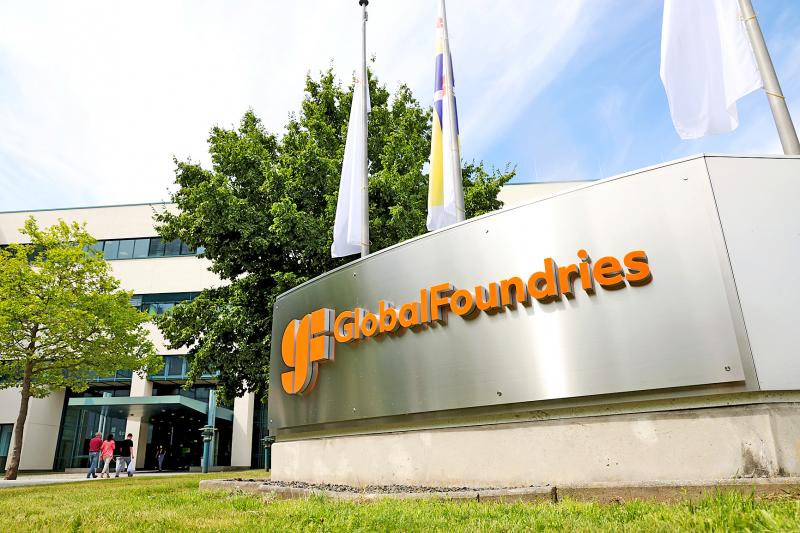GlobalFoundries Inc and major shareholder Mubadala Investment Co raised almost US$2.6 billion in an initial public offering (IPO), pricing the chipmaker’s shares at the top of a marketed range.
The company and Mubadala on Wednesday sold 55 million shares for US$47 each after marketing them for US$42 to US$47, according to a statement confirming an earlier report by Bloomberg News.
At US$47 a share, GlobalFoundries has a market value of more than US$25 billion based on the outstanding shares listed in its filings with the US Securities and Exchange Commission.

Photo: Bloomberg
The listing is the third biggest on a US exchange this year, topped only by South Korean e-commerce firm Coupang Inc’s US$4.55 billion IPO and Chinese ride-hailing company DiDi Global Inc’s (滴滴) US$4.44 billion raise, data compiled by Bloomberg showed. That does not include blank-check and similar companies.
GlobalFoundries is appealing to public-market investors as interest in the semiconductor industry hits an all-time high.
Shortages caused by a surge in demand for electronics during COVID-19 pandemic lockdowns and insufficient supply have made chip factories more valuable to the economy.
For the first half of the year, GlobalFoundries had a net loss of US$301 million on revenue of about US$3 billion, compared with a loss of US$534 million on US$2.7 billion in revenue a year earlier, according to the filings.
Contract chipmakers such as GlobalFoundries fabricate chips for large technology companies such as Apple Inc and Amazon.com Inc. Taiwan Semiconductor Manufacturing Co (TSMC, 台積電) and Samsung Electronics Co dominate the market, and Intel Corp has ambitions to become a bigger force in that area, too.
GlobalFoundries previously gave up on the kind of leading-edge production that would match the capabilities of TSMC or Samsung.
Instead, it is serving the market for less advanced chips, which are increasingly critical to automakers and other industries.

South Korea’s equity benchmark yesterday crossed a new milestone just a month after surpassing the once-unthinkable 5,000 mark as surging global memory demand powers the country’s biggest chipmakers. The KOSPI advanced as much as 2.6 percent to a record 6,123, with Samsung Electronics Co and SK Hynix Inc each gaining more than 2 percent. With the benchmark now up 45 percent this year, South Korea’s stock market capitalization has also moved past France’s, following last month’s overtaking of Germany’s. Long overlooked by foreign funds, despite being undervalued, South Korean stocks have now emerged as clear winners in the global market. The so-called “artificial intelligence

‘SEISMIC SHIFT’: The researcher forecast there would be about 1.1 billion mobile shipments this year, down from 1.26 billion the prior year and erasing years of gains The global smartphone market is expected to contract 12.9 percent this year due to the unprecedented memorychip shortage, marking “a crisis like no other,” researcher International Data Corp (IDC) said. The new forecast, a dramatic revision down from earlier estimates, gives the latest accounting of the ongoing memory crunch that is affecting every corner of the electronics industry. The demand for advanced memory to power artificial intelligence (AI) tasks has drained global supply until well into next year and jeopardizes the business model of many smartphone makers. IDC forecast about 1.1 billion mobile shipments this year, down from 1.26 billion the prior

Chinese artificial intelligence (AI) start-up DeepSeek’s (深度求索) latest AI model, set to be released as soon as next week, was trained on Nvidia Corp’s most advanced AI chip, the Blackwell, a senior official of US President Donald Trump’s administration said on Monday, in what could represent a violation of US export controls. The US believes DeepSeek will remove the technical indicators that might reveal its use of American AI chips, the official said, adding that the Blackwells are likely clustered at its data center in Inner Mongolia, an autonomous region of China. The person declined to say how the US government received

FORTUNES REVERSED: The new 15 percent levies left countries with a 10 percent tariff worse off and stripped away the advantage of those with a 15 percent rate In a swift reversal of fortunes, countries that had been hardest hit by US President Donald Trump’s tariffs have emerged as the biggest winners from the US Supreme Court’s decision to strike down his emergency levies. China, India and Brazil are among those now seeing lower tariff rates for shipments to the US after the court ruled Trump’s use of the International Emergency Economic Powers Act to impose duties was illegal. While Trump subsequently announced plans for a 15 percent global rate, Bloomberg Economics said that would mean an average effective tariff rate of about 12 percent — the lowest since